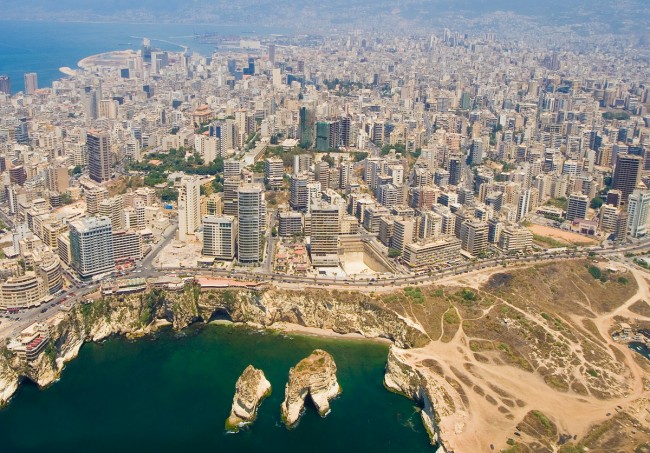Beirut Building Boom Alters the Skyline
04-22-2014

Added by Brian Yates Saved under Brian Yates, Lebanon, World
Beirut
A building boom in Beirut, Lebanon has altered the cityís skyline. Luxury towers have replaced traditional homes and businesses. The new skyscrapers, with their modern architectural designs, stick out at strange angles and lengths. Wedged wall to wall among the cityís traditional buildings, the new skyscrapers have replaced damaged structures or sprang up in former alleyways and parks.
From 1975 to 1990, the Lebanese civil war damaged many of Beirutís Ottoman and French style buildings. Rich Gulf Arabs and Lebanese expatriates have invested in Beirutís future and have driven up land prices making local owners are more than happy to sell their property.
Foreigners see the modernization effort as part of Beirutís charm. People coming to the new Lebanon fall in love with Beirut the moment they see it. Many see the building boom that is altering Beirutís skyline as a chance for the city to reestablish its former prominence.
The construction of new skyscrapers has created a plethora of jobs. Building cranes fill the skyline. Workers with jackhammers demolish the foundations of old structures and roads to make way for new ones.
Robert Saliba, a professor at the American University of Beirut, said the city has a culture of diversity and a free spirit making it attractive to foreign investment. A free market system has always guided Beirutís development. The city lies at a crossroads between Western and Middle Eastern cultures. Both Christians and Muslims have found ways of finding tolerance when it comes to commerce. Saliba did admit the city has become more saturated with new building at the expense of open spaces.
Salim Baalbaki fled Lebanon 15 years ago. Living in Canada, he recently returned to Beirut and barely recognized the place where he grew up. He found himself sadden from the moment he saw the cityís skyline from his planeís window. What he saw resembled a concrete jungle of strange buildings. He believes the new Lebanon has become an unrecognizable disaster.
The central district and seaside promenade where he grew up were once lined with trees. Those trees were now gone. In their place were luxury apartments. Living there costs upward of $9,144 per square yard making the rent unaffordable for most people.
The civil war raised the bustling downtown districts to the ground. Today, high-priced restaurants and boutiques can be found there.
A parking lot has replaced the local park where Baalbaki once played soccer with friends. Next to the apartment building where he grew up, a modern skyscraper blocks out the sunlight.
The cityís urban development has come at the expense of Beirutís past. Hundreds of traditional stone buildings with elaborate balconies, arched headways, and colorful gardens dating back to the Ottoman and French periods have vanished. A census in the 1990s counted 1600 traditional buildings and homes in and around Beirut. Only 250 structures remain.
Naji Raji, a spokesman and activist for Save Beirut Heritage blamed the demolitions on corruption. Politicians and regulators have received bribes for construction permits and have issued unknown regulations condemning buildings. Except for ministerial decrees, no laws protect traditional structures. Raji stated Beirut was losing its identity and becoming more like Dubai, a city heavy on tall skyscrapers and short on character.
Save Beirut Heritage maintains a hotline where its staff receives tips about traditional buildings facing demolition. The group immediately appeals to the Culture Ministry when they learn a property is about to be torn down. Since 2010, Save Beirut Heritage has stopped 60 buildings from destructions. His latest project is the prevention of the Fouad Boutros Highway that would cut through Beirutís historic quarters.
After 25 years of civil war, the peace that has come to Lebanon has allowed investors to rebuild the country. Beirut has taken the opportunity to bring its metropolis back to its former prominence with a building boom that has altered the cityís skyline.
By Brian T. Yates
Sources:
Fox News
ABC News
AP

